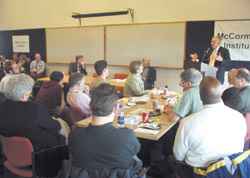Retired General Wesley K. Clark, as a guest of the McCormack Institute, spoke about US tensions with Iraq during an on-campus visit recently. While the appearance was minimally publicized, word quickly spread and Clark addressed a crowded room on October 9 on the eighth floor of the Healey Library.
Introduced by Edmund Beard, the Director of the McCormack Institute, General Clark began by making a few jokes about retiring and the pursuit of money, but quickly segued to serious issues. Clark mentioned a couple of editorial pieces in national newspapers, including an excerpt of one of his own, “My best scenario: A quick war, then lots of trouble,” published in the LA Times. (Printouts were available to audience members.) In the op-ed piece Clark stressed that the major problems of invading Iraq would involve the post-invasion chaos and establishing an effective Iraqi government.
General Clark mentioned his past assignment as the Director of Strategic Plans and Policy on the Joint Staff. “I discovered quickly there wasn’t a ‘New World Order,’ and we didn’t have a strategy,” Clark stated. Clark pointed out that there were two groups of thoughts about the military in the late eighties: one group, basically Republican, felt the military existed to fight and win U.S. wars; the second group, basically the Democrats, felt, since there were no major wars, the military should be involved in peacekeeping.
Both groups, Clark said, believed the defense budget was too large, and by 1991 it was being cut. But meanwhile the U.S. had many obligations that needed to be fulfilled-the U.S. sent food to Rwanda, invaded Haiti, dealt with Saddam and was involved in a war in the Balkans-all without a national strategy. “It was an incredible time in American history,” Clark said, noting that it wasn’t just the military that was strong, but also the strength of the economy was unprecedented.
Now, after September 11, the mood is far different, Clark said. “No one knows what unemployment is, it is above the official 5.7%, it’s probably 9.7%,” Clark pointed out, discussing new challenges. “We’ve created an interdependent world, … we didn’t understand the risks.”
Besides the economic woes of the moment, Clark highlighted the environmental troubles of our time, including pollution and health risks-the West Nile Virus is going to be only “the first of many diseases to travel across continents,” Clark predicted.
Addressing our world strategies, Clark said we will be “more prosperous if we build bridges instead of walls.”
Answering questions from the audience afterwards, Clark reiterated that war with Iraq would be fairly simple, but the aftermath could be chaotic.
One audience member asked what we can do to avert war “when we have an administration and President hell-bent on war.” Clark answered with the comments “you can’t make a law stick unless you’re willing to enforce it,” and “we have to minimize complications.” When the audience member repeated the question, stressing “how to avert war,” Clark reiterated, “we have to minimize the adverse consequences of fighting.” Clark further pointed out that the administration is representative of the voting public and that US citizens support a war with Iraq.





















































